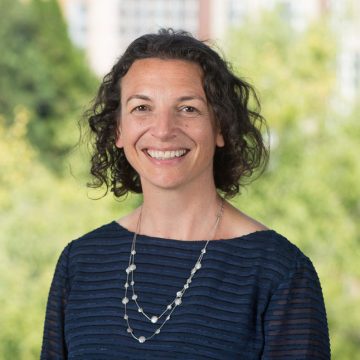It’s been nearly 20 years since Rachel Solotaroff graduated from Dartmouth's medical school with dreams of making an impact on disadvantaged communities. Now, she’s returning to campus to accept the 2020 Martin Luther King Jr. Social Justice Award for Ongoing Commitment in recognition of her work with Central City Concern, a Portland, Ore., organization serving adults and families who are affected by homelessness, poverty, and addictions.

“This is such an honor and means an enormous amount to me,” says Solotaroff, who will be on campus Thursday, January 30, for a panel discussion with other honorees. It will take place from 5:30 – 7:00 PM in Filene Auditorium in the Moore Building, and is open to the public. Solotaroff will also spend time speaking with students interested in working with marginalized populations and high-needs communities.
President and CEO of Central City Concern (CCC) since 2017, Solotaroff began her work there in 2006 as medical director of its Old Town Clinic. Founded in 1979, CCC helps nearly 14,000 people yearly. It is a Federally Qualified Health Center, providing primary, behavioral, and substance use disorder care across 13 locations in the metro Portland area. It also owns and manages more than 2,200 units of affordable housing, and its employment services help roughly 1,000 people gain jobs each year.
In her leadership of Old Town Clinic, Solotaroff secured national recognition from the Robert Wood Johnson Foundation's LEAP (Learning from Effective Ambulatory Practices) project as one of the 30 highest-performing clinics in the United States. In 2014, she received the Karen Rotondo Outstanding Service Award from the National Healthcare for the Homeless Council. The award recognizes hands-on caregivers who demonstrate vision and creativity in advancing the goals of ending and preventing homelessness, and who have made a significant contribution to improving the health and quality of life of people experiencing homelessness.
“If you want to solve the problem of homelessness in a community, you have to solve the problems that impact an individual: substance abuse, trauma, mental illness,” Solotaroff says. “But you also have to address structural challenges like unemployment, the absence of affordable housing, and structural racism. I can sit with patients for months helping them with addiction and mental illness, but helping them to find a supportive housing environment and meaningful wage work does far more than any prescription I could ever write.”
“Rachel is not only a model of the complete physician that Dartmouth’s medical school strives to develop but also a powerful example of a Dartmouth graduate who has answered the call to lead,” says Duane Compton, PhD, dean of the Geisel School of Medicine. “She has spearheaded projects that address the substance use crisis in America, the shortage of affordable housing, and healthcare disparities among the underserved. Her work is a reflection of Dartmouth’s vision to educate responsible leaders who are ready to take on the world’s most pressing challenges.”
Excited to return to campus for the first time in almost two decades, Solotaroff says, “Dartmouth gave me such a strong education, clinically but also in terms of understanding the value of being a good servant leader. Dartmouth showed me the extent to which physicians could be of service to a community through a holistic understanding of individuals and their experience.”
ABOUT THE MARTIN LUTHER KING JR. SOCIAL JUSTICE AWARDS
Dartmouth’s Social Justice Awards, co-sponsored by the Martin Luther King Jr. Celebration Committee, Office of Institutional Diversity & Equity, William Jewett Tucker Center, Dartmouth Center for Social Impact, and Geisel School of Medicine, were established to recognize members of the Dartmouth community including alumni/ae, current and former faculty, staff, student groups and others with ties to the college, who have contributed significantly to peace, civil rights, education, public health, environmental justice, or social justice.
The awards honor members of the Dartmouth community who have demonstrated their compassion, perseverance, courage, and leadership by engaging in the difficult work of fostering human dignity and our common humanity through their projects, programs, and visions.
The awards are given in four categories: Emerging Leadership, Ongoing Commitment, Lifetime Achievement, and Student Organization.
Please join us for the Social Justice Awards: Conversations with ChangeMakers, a panel discussion with 2020 Social Justice Awards honorees. Thursday, January 30, 2020, 5:30 – 7:00 PM, Filene Auditorium, Moore Building. Reception to follow.
Click here for information on all the honorees, and click here for event details.